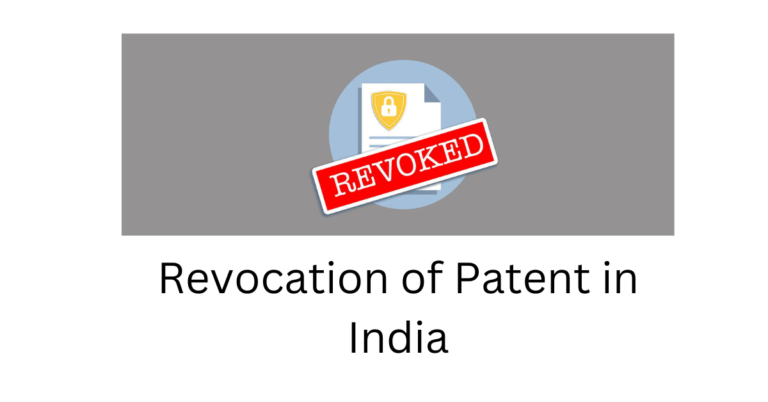What is Revocation of Patent?
Revocation, in its broadest sense, is the action of taking back something that has previously been granted. The same is true with patents, which cannot be regarded as permanent once issued. Revocation of a patent refers to the revocation of the patentee’s previously obtained rights. Any interested party may file a petition for the revocation of a patent, or the Central Government may do so as well.
Ground for revocation of Patent:
The grounds for revocation of Patent is given in Section 64 of the Indian Patent act, 1970:
- An invention having identical specifications in another Indian patent that was issued with a preceding filing date or priority date.
- The grant of Patent was done to a person who was not entitled for the same.
- A person who is legally entitled to the Patent received it from another without authorization. A different person who is legitimately entitled to the patent may submit a request for its revocation.
- According to Section 2(1)(j) of the 1970 Patent Act, the invention claimed in the awarded patent is not real.
- The invention claimed in the patent lacked novelty in light of past public use or prior knowledge.
- The innovation has no practical application, which means that the Patent is not being used at all or is not producing the expected outcomes as described in the Patent specifications.
- The Patent lack any inventive step.
- The claimed invention, which is a product of import to India, is not a recent development. The invention was widely publicized and in use in India prior to the publication date or priority date.
- The specifications of the patent do not sufficiently or clearly explain the scope of any claim.
- The patent specification falls short of accurately or sufficiently describing the invention or its processes.
- A misleading representation or implication was used to obtain the Patent. The claim or suggestion must be in accordance with any fact or representation made in connection with the grant of the patent or with any of the specifications thereof.
- In accordance with Section 8 of the Patent Act of 1970, the patent applicant has not revealed all the necessary information. Additionally, the applicant provided inaccurate information about the invention.
- In accordance with Section 35 of the Patent Act of 1970, the Patent Applicant failed to comply with the Controller’s request for confidentiality.
- The Controller’s failure to abide by the confidentiality directive when a patent application was filed outside of India without his or her prior consent.
- The applicant secured the right to change a patent’s whole specification under Sections 57 or 58 of the Patent Act of 1970 by fraud.
- The geographical origin or source of the biological material used in the invention are not fully disclosed in the patent’s specification.
- Any local or indigenous community in India or elsewhere has access to the traditional knowledge asserted in the patent specification.
The Supreme Court (SC) explained in its ruling in the case of Dr. Aloys Wobben & Anr. vs. Yogesh Mehra & Ors that, in accordance with Section 64 of the Patent Act, 1970, a patent may be revoked either through the submission of a revocation petition to the Intellectual Property Appellate Board (IPAB) or through the filing of a counterclaim in a lawsuit alleging patent infringement. The patent holder cannot be sued in both cases at the same time by the person challenging the validity of the patent. The challenger won’t be able to use the other remedy if the court tries to use one of the remedies.
Other provisions for revocation of patents:
Section 65-Revocation in cases related to Atomic Energy:
The Central Government may revoke a patent, according to Section 65 of the Patent Act of 1970. The Central Government may only revoke a patent after proving that the invention covered by the patent has something to do with atomic energy. According to the restrictions outlined in the Atomic Energy Act of 1962, patents cannot be granted for inventions relating to atomic energy. As a result, the Central Government of India does not permit the grant of a patent for an invention involving atomic energy.
Section 66-Revocation of Patent in Public Interest:
According to Section 66 of the Patent Act of 1970, where the Central Government believes that a patent or the way in which its connected rights are exercised is damaging to the general public or the State, the patent should be cancelled. The patent holder should be given a fair chance to exercise his or her right to be heard. The decision to revoke the patent will be made in accordance with the circumstances after the patent holder has been given an opportunity to respond.
Section 85-Revocation by Controller for Non-Working:
According to Section 85 of the Patents Act of 1970, a patent may be cancelled for failure to function. Any interested party or the government may submit an application to the Controller for the revocation of a patent with regard to a patent for which a compulsory license has been issued. Within two years of the compulsory license being granted, the patent revocation must be filed.
The grounds for Revocation are
- The patented invention does not function in Indian territory;
- The patent is not being used in a way that satisfies the reasonable requirements of the general public;
- The patented invention is not accessible to the general public for an affordable price.
Conclusion
The exclusive rights that have been given to the patentee with regard to an invention are cancelled when a patent is revoked. A patent may be revoked under Section 64 of the Act on a petition from any interested party, on a request from the Central Government made to the Appellate Board, or on a counterclaim made in a lawsuit brought by the High Court alleging patent infringement.







